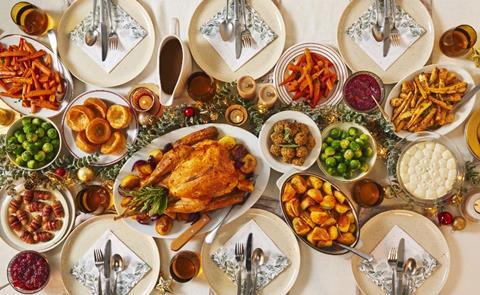Year-on-year sales growth of 9.4% in December ensures record Christmas sales as inflation continues to shape retail sector

UK supermarkets enjoyed their first-ever £12 billion Christmas, according to Kantar, however this was largely driven by grocery price inflation rather than increased purchasing.
December sales reached a new record of £12.8bn in 2022, breaching the £12bn mark for the first time thanks to year-on-year sales growth of 9.4%, the fastest rate recorded since February 2021.
Over the 12 weeks to 25 December, sales were up 7.6% compared to the same period in 2021.
Fraser McKevitt, head of retail and consumer insight at Kantar, said: “Monthly grocery sales were a whopping £1.1 billion higher in December versus last year, breaching the £12 billion mark for the first time.
“Value sales are up significantly but grocery price inflation is the real driving factor behind this rather than increased purchasing. If we look at the amount people bought this period, sales measured by volume are actually down by 1% year on year, showing the challenges shoppers are facing.
“This story played out across the traditional Christmas categories. For example, value sales of mince pies soared by 19% but volume purchases barely increased at all. Christmas puddings were popular, growing by 16% in value and 6% in volume terms.
“Brussels sprouts were off the menu for some households as the proportion buying them fell to 45% from 48%.”
Grocery price inflation now stands at 14.4%, down slightly from 14.6% in November. This made December the second month in a row in which grocery price inflation fell, raising hopes that the worst has now passed.
Nevertheless, McKevitt stressed that inflation is still “painfully high”, impacting how and what people buy.
Consumers continued to trade down to supermarkets’ own-label products in the 12 weeks to 25 December, with own-label sales rising by 13.3%, well ahead of a 4.7% increase in branded lines.
Retailers also enjoyed strong sales of premium own-label products, offering consumers a way to treat themselves at Christmas. Sales of these lines grew by 10.2% to hit more than £700 million for the first time.
Tesco’s Finest range remains the single largest premium own-label line by some distance, while Aldi and Lidl were the biggest contributors to the sector’s overall growth in 2022.
As always, the immediate lead-up to Christmas Day was a busy period for supermarkets. Friday 23 December was the most popular shopping day of the year, with more than half of the nation’s households going to stores or receiving a delivery.
Throughout December, physical stores were also 5.2% busier than in the same month the year before, making it stores’ busiest month since the start of the pandemic.
Meanwhile, the online grocery sector remained in growth thanks to a 4% increase in value sales year on year. However, there was a slight decline in online’s total share compared to Christmas 2021, nudging down by 0.6 percentage points to 11.6%.
Inflation’s impact can be seen on this part of the market too as the average cost of a virtual basket now sits at £93.06.
In terms of the breakdown between different retailers, buoyant Christmas sales were enjoyed across the board in December. The old Big Four (including Morrisons rather than Aldi) still captured most of the Christmas trading, with Tesco, Sainsbury’s, Asda and Morrisons accounting for more than two-thirds of all spending.
Asda led this group, with sales up by 6.4%, closely followed by Sainsbury’s and Tesco, which achieved sales growth of 6.2% and 6% respectively.
Despite sales falling by 2.9%, Morrisons had its best performance since June 2021, standing the retailer in good stead for a return to growth in 2023.
Aldi remained the fastest-growing grocer with 27% growth boosting its market share from 7.7% this time last year to 9.1%. Meanwhile, Lidl’s sales increased by 23.9%, moving its market share up by 0.9 percentage points to 7.2%.
Iceland’s sales grew by 10.2%, with sales of frozen poultry rising by 15% and frozen prepared foods by 18%. This pushed Iceland’s market share to 2.5%.
Co-op’s market share now stands at 5.6%, while Waitrose has 4.7%.
Ocado increased sales by 8.2%, maintaining a market share of 1.7%.



